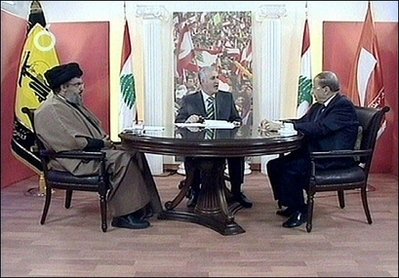 BEIRUT (AFP) – Lebanese Shiite opposition chief Hasan Nasrallah and Christian ally Michel Aoun on Wednesday demanded veto power in a future government to solve the country’s protracted presidential crisis. In a rare joint television interview on the second anniversary of their controversial alliance, Nasrallah and Aoun also insisted that their union helped spare Civil War.
BEIRUT (AFP) – Lebanese Shiite opposition chief Hasan Nasrallah and Christian ally Michel Aoun on Wednesday demanded veto power in a future government to solve the country’s protracted presidential crisis. In a rare joint television interview on the second anniversary of their controversial alliance, Nasrallah and Aoun also insisted that their union helped spare Civil War.
We cannot give up veto power because we cannot be mere spectators within the government," Aoun said in the three-and-a-half-hour interview broadcast on his Free Patriotic Movement’s Orange TV."It would spell our destruction.""Any attempt to evict the opposition from decision-making is unacceptable," Aoun added.Nasrallah for his part insisted that veto power "is the mechanism that guarantees building trust" with the ruling majority, "The problem today is the loss of trust and any political solution demands trust," Nasrallah said.
So far 13 sessions of parliament called to elect a new president since September have had to be scrapped A new session is scheduled for February 11. Arab League chief Amr Mussa was due to return to Beirut on Thursday after two previous mediation trips last month during which he proposed a three-point rescue plan.
The initiative calls for the election of army chief General Michel Sleiman as president, the formation of a national unity government in which no one party has a veto power, and the adoption of a new electoral law.
The ruling coalition has accepted the Arab plan but the opposition is demanding a third of the seats in a new government in order to secure veto power.
The political crisis has been exacerbated after seven people, all Muslim Shiites and including two followers of Hezbollah, were killed January 27 in confrontations with the army when protests over power cuts turned into riots.
"The army must undertake a serious and decisive investigation in order to protect itself," the Hezbollah chief said.
"Is it the army’s natural task to open fire on protesters?" said Nasrallah.
He stressed, however, that he considers "any attack on the army as an attack on the resistance (Hezbollah)."
The military prosecution announced last week the arrest of 17 people, including officers and soldiers, as part of an investigation into the bloodshed which has become known as "Black Sunday."
"On Black Sunday they (majority) tried to say that our alliance (with Aoun) fell apart. But we said that civil strife was prevented because of our alliance."



